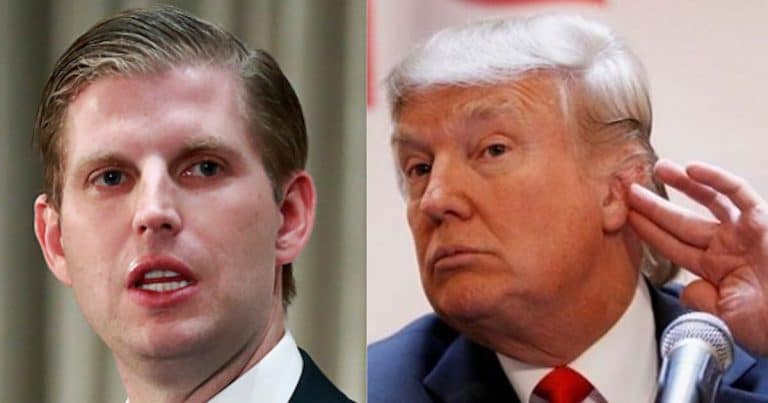
Foreign governments are scrambling to respond after President Donald Trump’s sweeping tariff announcement on Wednesday. The new policy imposes a 10 percent baseline tax on all goods entering the United States. Additional penalties target nations that have “ripped off” American taxpayers for decades. Global markets initially plunged following the announcement. International leaders expressed shock at the bold economic move. Some countries have already threatened retaliation. Others are signaling their willingness to come to the negotiating table.
This international commotion stems from President Trump’s determination to reset America’s trade relationships. Indeed, it’s about time someone prioritized domestic manufacturing and American jobs.
Eric Trump, the president’s son and Trump Organization executive, delivered a stark warning to foreign nations on Thursday that reveals the strategy behind his father’s bold economic move.
“I wouldn’t want to be the last country that tries to negotiate a trade deal with @realDonaldTrump,” Eric, who serves as vice president of the Trump Organization, wrote Thursday morning on the social platform X.
“The first to negotiate will win — the last will absolutely lose,” he continued. “I have seen this movie my entire life…”
President Trump himself acknowledged that these sweeping tariffs might create temporary economic adjustments. Yet he firmly maintains they will ultimately strengthen American manufacturing and create more jobs. In a Truth Social post Thursday, Trump compared the economic shift to a successful medical procedure.
“THE OPERATION IS OVER! THE PATIENT LIVED, AND IS HEALING,” the president wrote. “THE PROGNOSIS IS THAT THE PATIENT WILL BE FAR STRONGER, BIGGER, BETTER, AND MORE RESILIENT THAN EVER BEFORE. MAKE AMERICA GREAT AGAIN!!!”
The Art of Economic Negotiation
This tariff strategy follows the same negotiation playbook President Trump has employed throughout his business career. By creating leverage, he forces trading partners to recognize America’s economic power and address longstanding imbalances.
For decades, foreign countries have exploited America’s open markets while protecting their own industries. China, Mexico, Canada and the European Union have all benefited from unbalanced trade deals that previous administrations refused to confront.
Treasury Secretary Scott Bessent reinforced this approach Wednesday, urging foreign governments to consider the impact before choosing to retaliate. Several nations are already signaling their willingness to discuss more balanced trade relationships rather than face prolonged tariffs.
Wall Street’s immediate reaction was predictable. The stock market dropped sharply following the tariff announcement. Media critics quickly declared the policy a disaster.
But they miss the larger picture (as usual). Haven’t we seen this pattern before? The same “experts” who predict economic doom have been wrong time and again when it comes to Trump’s economic policies.
These tariffs create powerful incentives for manufacturers to return to American soil. They protect American workers from unfair foreign competition. They rebuild communities devastated by decades of offshoring.
The president made this priority clear in his Rose Garden announcement.
“We take care of countries all over the world,” he said. “We have to take care of our people and we’re going to take care of our people first.”
America First Economics in Action
These reciprocal tariffs represent more than just a negotiating tactic. They form the centerpiece of President Trump’s economic vision – one that puts American interests, workers, and manufacturing at the forefront of policy decisions.
For too long, globalist thinking has sacrificed American jobs on the altar of cheap foreign goods. The administration’s approach reverses this damaging trend by recognizing a fundamental truth: a nation cannot remain strong if it cannot produce what it needs.
While economists debate the short-term effects, working Americans understand that protecting domestic industries ensures their children will have manufacturing jobs available in the future—something the coastal elites with their imported luxuries seem completely unconcerned about.
The message to foreign nations couldn’t be clearer: Come to the table now, or face the consequences later.
Key Takeaways:
- President Trump’s tariff strategy forces other countries to negotiate fair trade deals or face economic consequences.
- Eric Trump’s insider warning gives foreign nations a clear choice: come to the table early or be left behind.
- Short-term market reactions miss the long-term benefits for American workers and manufacturing.
- The America First approach reverses decades of globalist policies that sacrificed domestic jobs.
Source: The Hill


